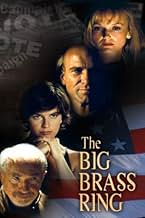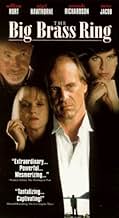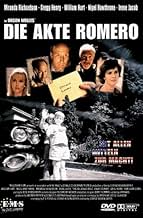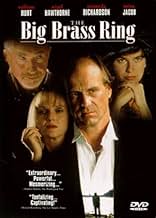Blake Pellarin is on the campaign trail to become Governor of the state of Missouri. During his stop in St. Louis, a chance encounter brings his past roaring back to haunt him. Will the trut... Read allBlake Pellarin is on the campaign trail to become Governor of the state of Missouri. During his stop in St. Louis, a chance encounter brings his past roaring back to haunt him. Will the truth ruin his chances to be elected, or will he land the "Big Brass Ring"?Blake Pellarin is on the campaign trail to become Governor of the state of Missouri. During his stop in St. Louis, a chance encounter brings his past roaring back to haunt him. Will the truth ruin his chances to be elected, or will he land the "Big Brass Ring"?
- Awards
- 1 win & 3 nominations total
Irène Jacob
- Cela
- (as Irene Jacob)
Peggy Freisen
- Gigi Moorehead
- (as Peggy Friesen)
Featured reviews
It might seem hard to imagine that a movie based on an Orson Welles script, starring William Hurt, Nigel Hawthorne, Natasha Richardson and Irene Jacob couldn't get a theatrical release. Get a snootful of ten or fifteen minutes of this flatliner and you'll understand why. The movie does make one contribution to Welles scholarship: it proves once and for all that in the case of the superhuman Welles, the words of the page were not the main event.
This is a murky story of politics, scandal, sex and deception. Sounds like it should have been a great film, but it wasn't. The basic plot was sound as we might expect from Orson Welles. But the way it was presented was too disjointed and abstruse. Without reading the original script, it is hard to tell if the responsibility for this lies with Welles, Oja Kodar (who did the adaptation) or George Hickenlooper, the director. I suspect it is the latter two.
The biggest problem I had was character development. By the end of the film one should reasonably expect the pieces to fit together. Good character development should give us insight into the characters' motivation. I found this lacking. The flashbacks didn't really help us to understand the motivations of the characters as much as they should have. It seems that the brothers voluntarily switched identities, since Billy was wearing a name tag that said "Romero" on his uniform when he left to go to war. So, Blake really didn't steal his brother's identity as it appeared. This wasn't made very clear.
There were lots of loose ends here. What motivated the limo driver to do what he did? Was it a need to be close to power, or some personal vendetta? Who knows?
From a directorial and cinematography point of view, the film was far too dark, that is, underexposed. I'm certain they were trying for that look, but it made the photography look as if it were shot on 30 year old film of poor quality. Also, the audio was very bad. It was very difficult understanding a lot of the dialogue.
William Hurt was miscast in this role. For certain films, his puling, self tortured style of delivery are appropriate to the character (Big Chill, Broadcast News, Children of a Lesser God). However, in this film his character required a more dynamic and confident portrayal, which he was unable to deliver.
Nigel Hawthorne gave the best performance as Kim Mennaker, the Senator who brought the boys up. His ability to portray the old political warhorse, seduced by the trappings of power was excellent.
Irene Jacob gave a good performance as Cela, the reporter with an obsession for the candidate and the truth behind him.
Overall, the whole was less than the sum of the parts. The presentation was ponderous and uneven and the direction mediocre at best. Worth a 5/10. If you are looking for political campaign stories, there are better choices (Primary Colors, The Candidate, with Robert Redford).
The biggest problem I had was character development. By the end of the film one should reasonably expect the pieces to fit together. Good character development should give us insight into the characters' motivation. I found this lacking. The flashbacks didn't really help us to understand the motivations of the characters as much as they should have. It seems that the brothers voluntarily switched identities, since Billy was wearing a name tag that said "Romero" on his uniform when he left to go to war. So, Blake really didn't steal his brother's identity as it appeared. This wasn't made very clear.
There were lots of loose ends here. What motivated the limo driver to do what he did? Was it a need to be close to power, or some personal vendetta? Who knows?
From a directorial and cinematography point of view, the film was far too dark, that is, underexposed. I'm certain they were trying for that look, but it made the photography look as if it were shot on 30 year old film of poor quality. Also, the audio was very bad. It was very difficult understanding a lot of the dialogue.
William Hurt was miscast in this role. For certain films, his puling, self tortured style of delivery are appropriate to the character (Big Chill, Broadcast News, Children of a Lesser God). However, in this film his character required a more dynamic and confident portrayal, which he was unable to deliver.
Nigel Hawthorne gave the best performance as Kim Mennaker, the Senator who brought the boys up. His ability to portray the old political warhorse, seduced by the trappings of power was excellent.
Irene Jacob gave a good performance as Cela, the reporter with an obsession for the candidate and the truth behind him.
Overall, the whole was less than the sum of the parts. The presentation was ponderous and uneven and the direction mediocre at best. Worth a 5/10. If you are looking for political campaign stories, there are better choices (Primary Colors, The Candidate, with Robert Redford).
This is a movie that someday will be remade so that it can be understood by those who haven't read the script. The premise of the movie is that a guy switches identity with his brother (I think) and proceeds to live their lives as one another.It is not convincing as to the reason why both would want to do so or how this would be pulled off for those who knew them. Overall most viewers should find this something to avoid.
William Hurt plays Gubernatorial candidate William Blake, in the final days of his election campaign. Nigel Hawthorne is Kim Mennaker, a svengali figure from Blake's childhood, who lives in Cuba for some reason, and has evidence which can sink Blake's election chances. Actually, by halfway through the movie, half of Missouri seems to have this evidence, and why nobody actually uses it is about as bewildering as why Hurt wanders about all night with a monkey on his shoulder, which he had previously complained had urinated all over him - unless that's a pun on a monkey for his back.
As usual, William Hurt is boring (look, I'm sorry, but he just is). Nigel Hawthorne, on the other hand, is incapable of being less than good, though his character is really quite ridiculous.
An understated movie, which, I admit, has emotional subtleties and plot complexities which keep it above average, but which ultimately don't save it from being a bit soporific. I'll give it 6.0. Worth watching, but don't expect to be dazzled.
As usual, William Hurt is boring (look, I'm sorry, but he just is). Nigel Hawthorne, on the other hand, is incapable of being less than good, though his character is really quite ridiculous.
An understated movie, which, I admit, has emotional subtleties and plot complexities which keep it above average, but which ultimately don't save it from being a bit soporific. I'll give it 6.0. Worth watching, but don't expect to be dazzled.
5=G=
"The Big Brass Ring" tells of a Missouri gubernatorial candidate (Hurt) who find himself haunted by guilt, stalked by a beautiful reporter, and the possible target of an assassination plot. A blotch on "Singblade" director Hickenlooper's resume coming on the heels of a worthy little indie "Dogtown", this tale of redemption and regret loses it humanness in a circus of pompous dialogue, overwrought histrionics, vague noir ambiance, and disjointed editing. In spite of fine performances and filming, "The Big Brass Ring" can't manage one believable character much less one reason to care leaving only a sense of detached ambivalence and confusion. A very attractive but passable DVD watch for fans of the players only. (C)
Did you know
- TriviaThe "big brass ring" of the title is a reference to the high brass rings found in old fashioned gyms and swimming pools, which one was supposed to jump up to and grab. It is a metaphor for that which is difficult to attain, or at least hard to hold fast and retain.
- GoofsIn the scene just after Blake (Hurt) and Brandini (Jacob) make love, she is still in bed and trying to encourage Blake to go public with the truth. She suggests that she might expose him if he doesn't. Blake yanks off the bedcovers, exposing her completely-naked body. But in the next-second close-up, something covers her from the waist down.
- ConnectionsReferences Citizen Kane (1941)
- SoundtracksMortal Thoughts
Written and Performed by Scott Nickoley (ASCAP) and Jamie Dunlap (as Jaime Dunlap) (BMI)
Published by Red Engine Music (ASCAP), Revision West (BMI), Brunello Music (ASCAP), JDSoul Music (BMI)
Courtesy of Mark Ferrari/Mastersource
Details
- Release date
- Country of origin
- Languages
- Also known as
- The Big Brass Ring
- Filming locations
- Production companies
- See more company credits at IMDbPro
Box office
- Budget
- $7,000,000 (estimated)
- Runtime
- 1h 44m(104 min)
- Color
- Sound mix
- Aspect ratio
- 1.33 : 1
Contribute to this page
Suggest an edit or add missing content

































